| Sonnet 75 | |||||||
|---|---|---|---|---|---|---|---|
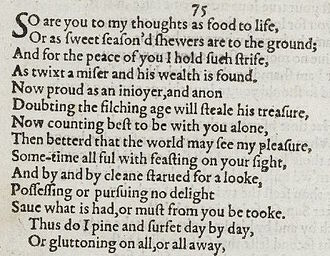 Sonnet 75 in the 1609 Quarto | |||||||
| | |||||||
| |||||||
Sonnet 75 is one of 154 sonnets written by the English playwright and poet William Shakespeare. It is a member of the Fair Youth sequence, in which the poet expresses his love towards a young man.
| Sonnet 75 | |||||||
|---|---|---|---|---|---|---|---|
 Sonnet 75 in the 1609 Quarto | |||||||
| | |||||||
| |||||||
Sonnet 75 is one of 154 sonnets written by the English playwright and poet William Shakespeare. It is a member of the Fair Youth sequence, in which the poet expresses his love towards a young man.
The poet expresses his complete pleasure in the presence of his beloved, but says that his devotion resembles that of a miser to his money, filled with anxiety combined with pleasure in his wealth.
Sonnet 75 is an English or Shakespearean sonnet. The English sonnet has three quatrains, followed by a final rhyming couplet. It follows the typical rhyme scheme of the form, ABAB CDCD EFEF GG, and is composed in iambic pentameter, a type of poetic metre based on five pairs of metrically weak/strong syllabic positions. The 4th line exemplifies a regular iambic pentameter:
× / × / × / × / × / As 'twixt a miser and his wealth is found. (75.4)
The 6th line exhibits two common variations: an initial reversal and a final extrametrical syllable or feminine ending:
/ × × / × / × / × / (×) Doubting the filching age will steal his treasure; (75.6)
Line 8 necessarily repeats the 6th line's feminine ending. Possible initial reversals also occur in lines 1, 2, 3, 9, 12, and 13; though these can be interpreted in other ways.
The meter demands a few variant pronunciations: in the 2nd line, "showers" functions as 1 syllable, and in the 10th line "starvèd" functions as 2. [2]
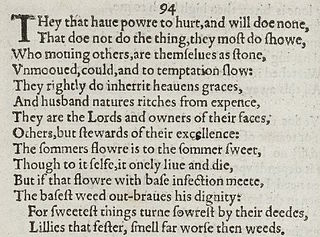
Sonnet 94 is one of 154 sonnets written by the English playwright and poet William Shakespeare. It is a member of the Fair Youth sequence, in which the poet expresses his love towards a young man.

William Shakespeare's Sonnet 43 employs antithesis and paradox to highlight the speaker's yearning for his beloved and sadness in their absence, and confusion about the situation described in the previous three sonnets. Sonnet 27 similarly deals with night, sleep, and dreams.
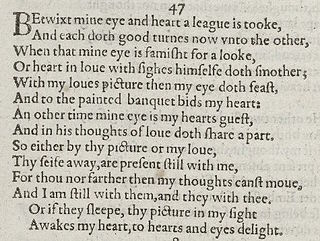
Shakespeare's Sonnet 47 is one of the Fair Youth sequence, addressed to a well-born young man. More locally, it is a thematic continuation of Sonnet 46.
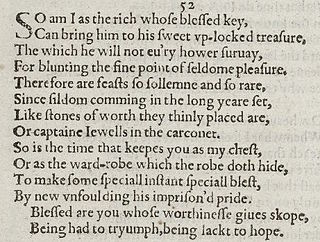
Sonnet 52 is one of 154 sonnets written by the English playwright and poet William Shakespeare. It is a member of the Fair Youth sequence, in which the poet expresses his love towards a young man.
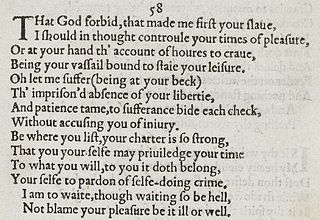
Shakespeare's Sonnet 58 is a syntactic and thematic continuation of Sonnet 57. More generally, it belongs to the large group of sonnets written to a young, aristocratic man, with whom the poem's speaker shares a tempestuous relationship. In this poem, the speaker complains of the beloved's voluntary absence, using the occasion to outline a more general lament against his own powerlessness and the indifference of the young man.

Sonnet 61 is one of 154 sonnets written by the English playwright and poet William Shakespeare. It is a member of the Fair Youth sequence, in which the poet expresses his love towards a young man.

Sonnet 91 is one of 154 sonnets written by the English playwright and poet William Shakespeare. It's a member of the Fair Youth sequence, in which the poet expresses his love towards a young man.
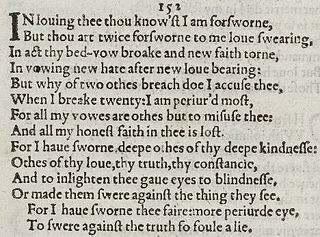
Sonnet 152 is a sonnet by William Shakespeare. It is one of a collection of 154 sonnets, dealing with themes such as the passage of time, love, beauty and mortality, first published in a 1609.
Sonnet 149 is one of 154 sonnets written by the English playwright and poet William Shakespeare.

Sonnet 142 is one of 154 sonnets written by the English playwright and poet William Shakespeare.

Sonnet 131 is a sonnet written by William Shakespeare and was first published in a 1609 quarto edition titled Shakespeare's sonnets. It is a part of the Dark Lady sequence, which are addressed to an unknown woman usually assumed to possess a dark complexion.

Sonnet 119 is one of 154 sonnets written by the English playwright and poet William Shakespeare. It's a member of the Fair Youth sequence, in which the poet expresses his love towards a young man.

Sonnet 90 is one of 154 sonnets written by the English playwright and poet William Shakespeare. It is a member of the Fair Youth sequence, in which the poet expresses his love towards a young man.
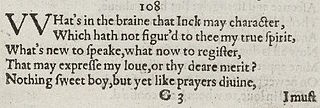
Sonnet 108 is one of 154 sonnets written by the English playwright and poet William Shakespeare. It is a member of the Fair Youth sequence, in which the poet expresses his love towards a young man.

Sonnet 111 is one of 154 sonnets written by the English playwright and poet William Shakespeare. It is a member of the Fair Youth sequence, in which the poet expresses his love towards a young man.
Sonnet 113 is one of 154 sonnets written by the English playwright and poet William Shakespeare. It's a member of the Fair Youth sequence, in which the poet expresses his love towards a young man.

Sonnet 114 is one of 154 sonnets written by the English playwright and poet William Shakespeare. It is a member of the Fair Youth sequence, in which the poet expresses his love towards a young man.

Sonnet 115 is one of 154 sonnets written by the English playwright and poet William Shakespeare. It is a member of the Fair Youth sequence, in which the poet expresses his love towards a young man.
Sonnet 120 is one of 154 sonnets written by the English playwright and poet William Shakespeare. It's a member of the Fair Youth sequence, in which the poet expresses his love towards a young man.

Sonnet 121 is one of 154 sonnets written by the English playwright and poet William Shakespeare. It is a member of the Fair Youth sequence, in which the poet expresses his love towards his young lover.